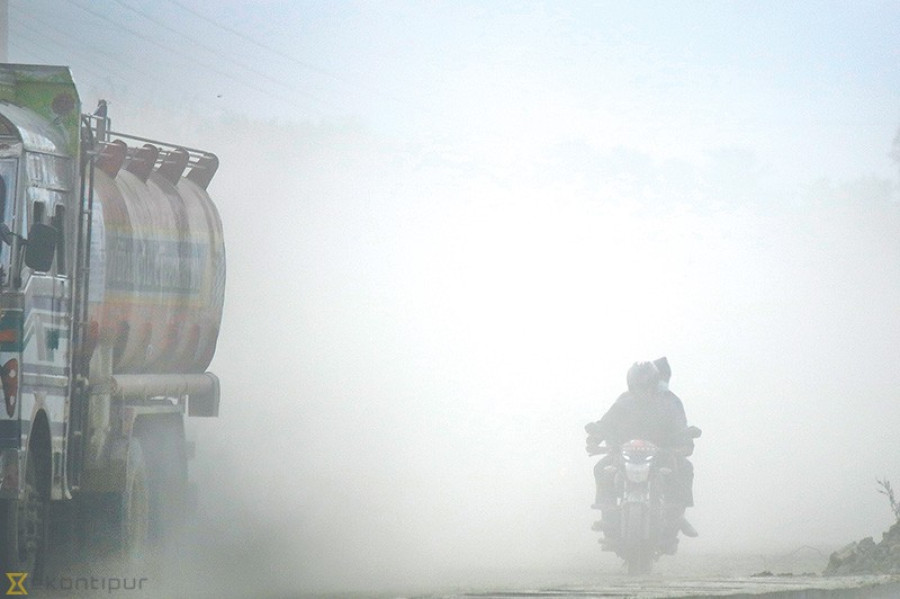National
Environmentalists say government can start with using tax pollution to combat poor air quality
The government has collected over Rs7 billion after levying 50 paisa per litre on petroleum products as pollution tax, but it has remained unused.
Chandan Kumar Mandal
With winter setting in, Kathmandu Valley and other major cities are now once again bracing for extreme levels of pollution.
The government, however, looks clueless yet again on how to deal with the poor quality of air this year, as it does not have any concrete plans. Air quality has already started deteriorating.
Environmentalists say the government should make the most of the billions of funds it has collected over the years to control pollution.
The government has collected over Rs7 billion by levying 50 paisa per litre on petroleum products as a pollution tax, but the amount has remained unspent.
According to them, the money can be used for setting up short- and long-term goals for dealing with air quality as the fund is enough for taking such initiatives in the country.
"This is unfortunate to see why the money which is collected from the public for issues of such a huge public concern has remained unutilised for years. It shows a lack of seriousness," said Manjeet Dhakal, an environmentalist and climate change expert. "For receiving a few millions from donour agencies and other countries, we have to go through a rigorous process. But we already have enough money to use for the larger public health cause."
The government started collecting 50 paisa per litre on diesel and petrol since the fiscal year 2008-09, with a view to spending the fund on programmes and activities aimed at tackling air pollution in the Valley. The following year, the tax was collected from across the country. However, the fund has remained idle at the Ministry of Finance for over a decade now.
According to Dhakal, the fund, which is collected from the sources of pollution—petroleum products—should be spent on minimising emissions from vehicles and dust from roads.
"For immediate measures, the money should be spent on promotion of electric vehicles," said Dhakal. "For longer goals, we have to ultimately work on sustainable and green modes of transport like dedicated cycle lanes. The fund also can be utilised on setting up charging stations and building infrastructure."
The quality of air in Kathmandu Valley and other parts of the country has already gone down. For the last few years, Kathmandu and Nepal have been frequently ranked as one of the most polluted cities and countries in the world, primarily due to exhaust and dust emanating from vehicles, brick kilns and the construction sector, among others.
The country's larger dependency on traditional biomass energy sources that include firewood, cattle dung, and agricultural residues also contributes significantly to polluting the air, mainly indoors.
According to Bhupendra Das, an environmental specialist with expertise on clean energy and air pollution, since the government has collected funds from the sources that emit smoke and pollute the air, the money should accordingly be spent on controlling the smoke coming from diverse sources.
"While outdoor air pollution is one of the major killers in the country, indoor air pollution also kills nearly 21,000 people, according to the WHO study," said Das. "The focus should also be on minimising indoor air pollution. For this, the fund can be utilised to provide subsidised electric induction stoves and promote improved stoves to reduce excessive burning of firewood and kerosene. It also stops environmental degradation like clearing the forest for firewood."
Das also called for dedicated policies, strategies, and action plans on air pollution that can further provide guidelines on how these funds can be better utilised on more extended vision like introducing mass electric vehicle fleets through subsidies among other measures.
The country continues to blow billions of rupees on imports of fossil fuel, which in return emit various harmful particulate matters that can easily mix up in the air before it is inhaled by the people.
"Consumption of petroleum products is likely to go down at least in the urban areas in the next few years, meaning the funds will shrink as well. The available money can be used for covering major costs required as the initial investment on infrastructure before we start complaining that we do not have enough money," said Dhakal. "With the political will, we can immediately swing into actions this year as well. If we can complete preparations within days when there are high-level visits, we should also be able to start working on the public menace of air pollution."




 13.12°C Kathmandu
13.12°C Kathmandu














